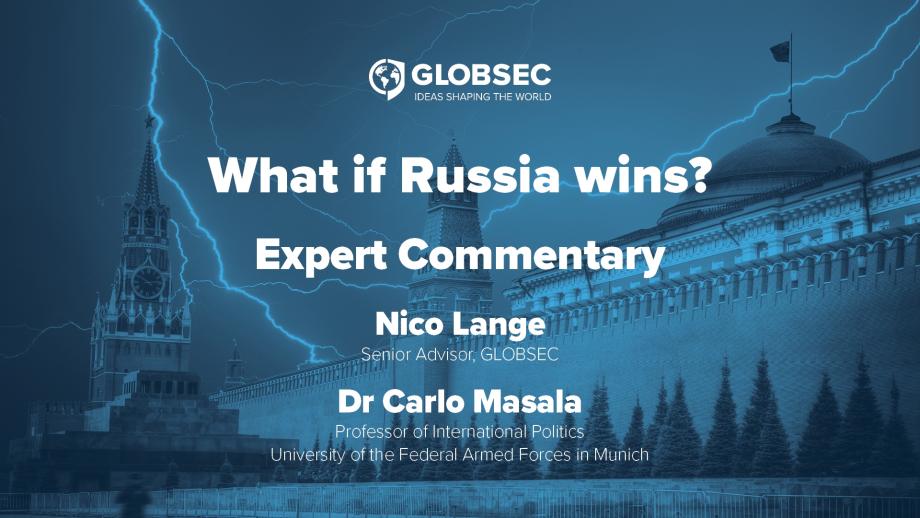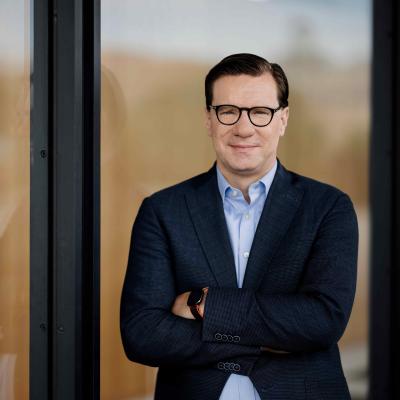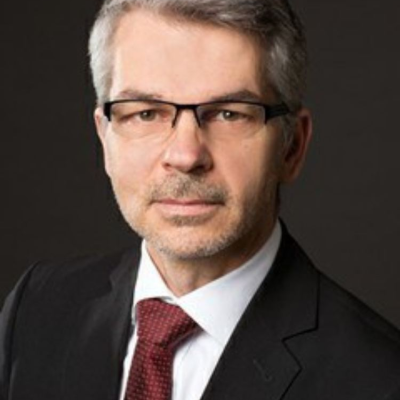War Against Ukraine: What if Russia Wins?

Vladimir Putin's war is aimed at the European security order. If he gets his way, it will be the end of the world as we know it. No one in Europe would be safe anymore. Nico Lange is a Senior Advisor at GLOBSEC. Carlo Masala is a Professor of International Politics at the University of the Federal Armed Forces in Munich. The two political scientists are concerned about the Russian war against Ukraine. If the defence against the aggressor fails, they see a threatening scenario.
Sirens wail. Cell phone warning tones shrill a thousand times. Air raids in Paris, Warsaw, and Berlin. Cruise missiles and swarms of drones invade European NATO airspace. NATO soldiers have been engaged in firefights in the Baltic States for days. In response to Russian attacks there, NATO triggered Article 5. Russia responded with missiles. Some states withdrew from NATO and the EU, while a hard core in the north and east put up fierce resistance. Germany and other countries are torn. Violent riots break out during heated protests in many German, French, Italian, and Spanish cities, and the police must take robust action. Extremist and populist parties benefit enormously from the situation, not least because global trade and the economy collapse. In the Indo-Pacific, China has been launching attacks on Taiwan for weeks. Meanwhile, the United Nations is passing resolutions against the European NATO Members because many African, Latin American, and Asian states are voting with Russia and China in the General Assembly.
Does that sound exaggerated? No! If Vladimir Putin wins his war of aggression, this scenario is realistic. It is, therefore, worth supporting Ukraine in its defence against the Russian aggressor with everything Europe and the United States have at their disposal - because much more is at stake than the territorial integrity and sovereignty of Ukraine. Putin's attack is aimed at the European security order. To make this clear, we embark on an intellectual journey and ask the question: What if Russia were to win this war?
We understand winning to mean a situation in which, as part of negotiations or because of military realities on the ground, Russia is, in fact, permanently awarded the parts of Ukraine's territory that it currently occupies or conquers further.
Ukraine would then remain a permanent trouble spot in Eastern Europe. The Ukrainian Armed Forces would continue their fight against the Russian invaders, either regularly or as partisans, underground and with terrorist attacks. Constant attacks and assaults would continue the war on another level, while Russia would continue the violence in the occupied territories with purges, murder, child abductions and torture. Both the territories occupied by Russia and the rest of Ukraine would be permanently unstable.
More Ukrainians would leave the country. Some because they do not want to live in the Russian-occupied territories and cannot live there due to the Russian repression that is to be expected, and others because a remaining Ukraine that is still at war offers no prospects for adults and children. The high degree of militarization of society, mass exodus and the de facto loss of territories would encourage extremist and violent forces in Ukraine. The rapid development and operational readiness of Ukrainian nuclear weapons would also become more likely. Europe would be dominated for years by a permanent conflict with nuclear weapons on both sides. This could also result in an ongoing debate on nuclear armament for additional countries.
Refugees and expulsion would be a huge issue for Europe at a time when the EU is already overwhelmed by illegal migration from other parts of the world.
If Russia emerges victorious from this conflict, it will give a considerable boost to Russian nationalism and neo-imperialism. With a revanchist "We're back!", Russia would plan new military attacks in the rush of victory against the backdrop of the experience that the collective West has nodded off in front of Russian nuclear weapons and Russian military power and move on to open political blackmail of the collapsed West with energy and raw material weapons. Kyiv and the rest of Ukraine, Georgia, and the Republic of Moldova would be just as clear military targets as the Baltic states. What else should make Moscow believe that the NATO states - in the face of Russian nuclear threats - will rush to the aid of their territorially small member states with all their military might?
In short, no one in Europe would be safe anymore. Humanitarian, economic, and military costs would rise rapidly, far more than the current shortfall of at least two per cent of defence spending as a percentage of gross domestic product.
What would be necessary for our security would be almost impossible to communicate within many NATO member states at this point. A victorious Russia would give the right-wing and left-wing extremists in many European countries a considerable boost. They could justifiably claim that they have always been right in saying that it is not worth supporting Ukraine, as it would lose anyway. Russia is simply a power factor that you must live with and come to terms with, and in view of its nuclear power, the only option in the end is submission. Russia would accompany this development with intensive influence operations, open support and financing of populists and extremists, and disinformation. Extremists who could win upcoming elections, form minority governments or even enter governments as minor or major coalition partners would become more likely in Europe.
Such a development would have a direct impact on the European Union, which right-wing and left-wing extremists are equally opposed to, as well as on NATO, from which some of these parties would rather leave yesterday than tomorrow. Added to this are the domestic political developments in the USA. NATO's days would be numbered. Russia would dominate Europe because of such a development. Incidentally, this is precisely the aim of the "new security order in Europe", which, according to Putin himself, is the strategic goal of his war against Ukraine.
A Russian victory against Ukraine would not only have catastrophic consequences for Europe but also for the rest of the world. We are already seeing how China, Iran and other actors are assessing the willingness of the "West" to stand up robustly for its values and the liberal world order. It is no coincidence that, in the shadow of Russia's war of aggression, the Middle East is being destabilized and that China is brutally testing its borders with the Philippines. Azerbaijan took advantage of the West's distraction caused by the Russian war of aggression to launch a second attack on its neighbour Armenia and to recapture the Nagorno-Karabakh enclave, which is disputed under international law. From a global perspective, this would only be the beginning. Stronger states, in the belief that there would be no significant international reaction, could invade smaller states, settle old territorial scores, or dare to reach for regional supremacy. From this perspective, a Chinese attack on Taiwan would not only be conceivable but highly likely. The "reorganization of the world order", as Putin recently put it, would proceed with all its might and force.
The rest of Ukraine and many other states in the world would draw the logical conclusion from the Russian war of aggression that they cannot protect the international community of states and the rules-based order but only their own nuclear weapons. A new round of nuclear proliferation would be the consequence, at the end of which there could be fifteen or more nuclear powers rather than the current nine. This would increase the risks of miscalculation and the possibility of technical failure.
A Russian victory over Ukraine would herald the end of the world as we know it. The West would be disavowed as a guarantor of stability, security, and order. Revisionist actors such as China, Russia, Iran, and others, together with their allies, would impose their ideas of international order. The universality of human rights would be relativized; autocratic regimes would be strengthened globally, democracy would be weakened worldwide and made contemptible, and global flows of goods and global prosperity would be diverted away from us. Our lives in Europe would be more insecure, poorer, and lonelier.
We have set up a thought experiment: What if? If Russia wins the war against Ukraine? Our thought experiment shows that a Russian victory would have incalculable consequences for European and global stability, that a Russian victory could be the beginning of something that no democrat could like, namely the end of the liberal world order and the beginning of an authoritarian one. Our thought experiment also shows that a Russian victory would cost us all much more politically and economically than the military resources that would have to flow into Ukraine for the Ukrainians to defeat Russia. More German involvement could make a significant contribution to protecting the global order from fundamental upheavals that are against our interests and our basic values.
The wailing sirens, air strikes and battles in our scenario are, unfortunately, more realistic than many people think. The fact that the dangers are also real for us is the real "Zeitenwende". To respond appropriately, we must undoubtedly weigh things up carefully and think "from the end" in terms of ethical responsibility. Putin wants to destroy the world as we know it and, therefore, invaded Ukraine. If we want to save the world as we know it, we must work together with Ukraine to repel his attack. The reward would be more than worth the effort. Because a Ukraine that is finally completely freed from the Russian imperial grip as a member of NATO and the EU would give Europe a boost in terms of security, prosperity, and global prestige. At the same time, Putin's defeat and, consequently, his foreseeable fall would open opportunities for a peaceful and constructive role for Russia in Europe in the future. In this respect, Russia's defeat in Ukraine is also in the interests of Russia and its society.


Senior Advisor to GLOBSEC and former Chief of Executive Staff at the German Federal Ministry of Defence
Professor of International Politics at the University of the Federal Armed Forces in Munich